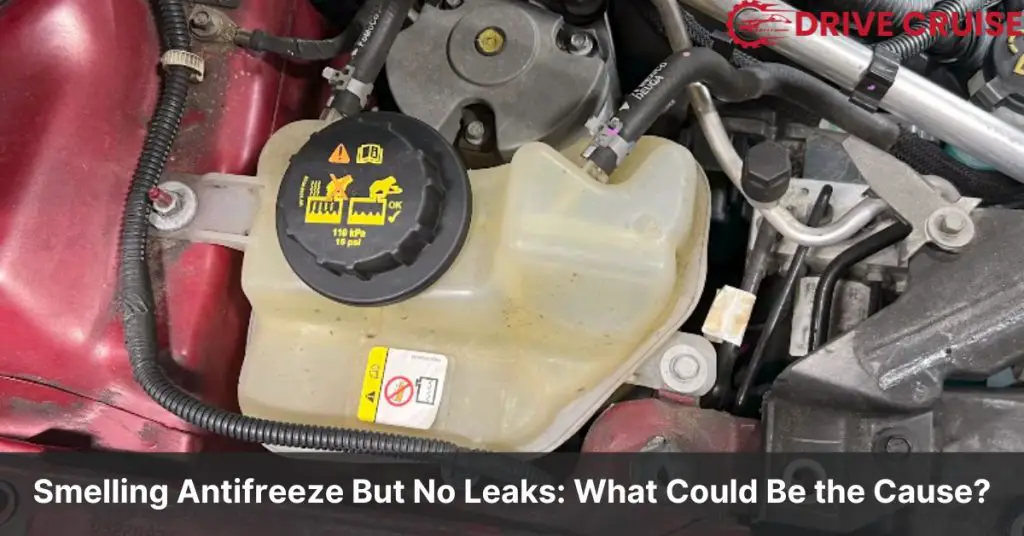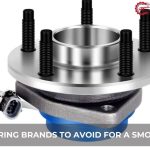Have you ever noticed a sweet, syrupy scent of antifreeze in your car, but couldn’t find any visible leaks? It can be a puzzling and concerning situation. The smell of antifreeze in your car is not normal and could indicate an issue with your vehicle’s cooling system. In this guide, we will explore the possible causes of smelling antifreeze but no leaks, and what you can do to diagnose and fix the problem.
One possible cause of smelling antifreeze but not overheating is a leaking heater core. The heater core is a small radiator located inside the dashboard of your car. The same coolant that flows through the engine also flows through the heater core, but only when you turn the heater on. If the heater core is leaking, it could cause the sweet smell of antifreeze in your car. Another possible cause is a cracked coolant reservoir. If the coolant reservoir is broken or cracked, the vehicle will emit a sweet smell from the engine bay.
It’s essential to address the issue promptly to avoid any potential damage to your car’s engine. In the next section, we will explore some of the possible causes of smelling antifreeze but no leaks and what you can do to diagnose and fix the problem.
Understanding Antifreeze: The Coolant Conundrum
Antifreeze, also known as engine coolant, plays a vital role in keeping your car’s engine running smoothly. It is a mixture of water and chemicals that helps regulate the temperature of your engine and protect it from corrosion.
Temperature Regulation
One of the primary functions of antifreeze is to regulate the temperature of your engine. As your engine runs, it generates a lot of heat, which can cause it to overheat and suffer damage. Antifreeze helps prevent this by absorbing and transferring heat away from the engine block and cylinder head.
Corrosion Protection
Antifreeze also contains additives that protect your engine’s internal components from rust and corrosion. Over time, the metal parts of your engine can start to corrode, which can lead to leaks and other problems. Antifreeze helps prevent this by forming a protective barrier that keeps the metal parts of your engine from coming into contact with each other.
If you smell antifreeze in your car but can’t find any leaks, it could be a sign that something is wrong with your engine coolant system. Some of the possible causes of this problem include a leaky coolant system, a damaged radiator, a faulty head gasket, or a cracked coolant reservoir. It’s important to address this issue promptly to avoid any further damage to your engine.
The Scent Detectives: Unveiling the Culprits
If you are smelling antifreeze inside your car but can’t seem to find any visible leaks, don’t worry, you’re not alone. While a leak is the most common cause of an antifreeze smell, other possibilities exist. Let’s take a closer look at some of the culprits that might be responsible for that sweet smell.
Spilled Coolant
Have you recently topped off your coolant reservoir? A minor spill around the filler neck could be the source of the odor, especially if it wasn’t properly cleaned. Carefully examine the reservoir and surrounding areas for any dried coolant residue. It’s essential to clean any spills completely, as even small amounts of spilled antifreeze can evaporate over time, leaving behind a lingering odor without necessarily forming visible puddles.
Heater Core Leak
The heater core is a radiator-like component located inside your car’s dashboard that provides heat. A small leak in the heater core can cause the sweet smell of antifreeze to enter the car’s cabin through the ventilation system. This is often accompanied by foggy windows or a dampness on the passenger side floorboard. If you suspect a heater core leak, it’s best to take your car to a mechanic to have it checked out.
Blown Head Gasket
In severe cases, a blown head gasket can allow antifreeze to leak internally into the engine’s combustion chambers. While the absence of external leaks might be puzzling, symptoms like rough idling, white smoke from the exhaust pipe, and coolant bubbling in the reservoir can point towards this more serious issue. If you suspect a blown head gasket, it’s best to take your car to a mechanic immediately to avoid further damage to your engine.
Diagnosing the Problem: A Multi-Step Approach
If you’re smelling antifreeze but not losing coolant, or if your car smells like coolant but there’s no visible leak, it’s important to diagnose the problem as soon as possible. Ignoring the issue can lead to serious engine damage and costly repairs down the line. Here’s a breakdown of steps to diagnose the source of the antifreeze smell:
Visual Inspection
The first step in diagnosing the problem is to pop the hood and perform a thorough visual inspection of the entire cooling system. Check the radiator hoses, clamps, water pump, and coolant reservoir for any signs of leaks, cracks, or dried coolant residue. If you spot any visible leaks, it’s important to address them right away. However, if you don’t see any visible leaks, move on to the next step.
Cabin Air Filter Check
A clogged or damp cabin air filter can sometimes trap and concentrate the antifreeze odor, even if the leak isn’t directly related to the ventilation system. If you notice that the smell is stronger when the ventilation system is turned on, it’s a good idea to check the cabin air filter. Replace it with a new one if it’s clogged or damp to eliminate this possibility.
Coolant Level Monitoring
If you’ve performed a visual inspection and checked the cabin air filter, and you still can’t find any visible leaks, the next step is to monitor your coolant reservoir level over the next few days. A noticeable decrease in coolant level without any visible leaks can indicate a hidden internal leak, such as a blown head gasket. If you suspect an internal leak, it’s important to have your vehicle inspected by a qualified mechanic as soon as possible.
Seeking Professional Help When Needed
If you have followed the troubleshooting tips and still can’t find any visible leaks or the source of the antifreeze smell, it may be time to seek professional help. A qualified mechanic possesses the expertise and tools to diagnose the problem accurately and recommend the appropriate repairs.
It is important to address any issues with your car’s cooling system promptly to avoid any potential damage to your engine. If you smell antifreeze but no leaks, it could indicate an internal leak, such as a faulty head gasket. This can cause your engine to overheat and lead to costly repairs if left unaddressed.
If you suspect a heater core leak or blown head gasket based on the accompanying symptoms, such as white smoke from the exhaust or a sweet smell coming from the vents, consulting a qualified mechanic is crucial. They can perform a pressure test to check for leaks and determine the exact cause of the antifreeze smell.
Remember that regular maintenance and inspections can help prevent issues with your car’s cooling system. This includes checking your coolant levels and ensuring your radiator cap is tightly fastened. If you notice any unusual smells or leaks, it’s always best to address them promptly to avoid any potential damage to your car.
If the smell persists after your inspection, or if you suspect a heater core leak or blown head gasket based on the accompanying symptoms, consulting a qualified mechanic is crucial. They possess the expertise and tools to diagnose the problem accurately and recommend the appropriate repairs.
Prevention is Key: Maintaining a Healthy Cooling System
Ensuring that your car’s cooling system is in good condition is essential to prevent problems such as antifreeze smells without leaks. Here are some tips for maintaining a healthy cooling system:
Regular Coolant Flushes
Regular coolant flushes are essential to maintain optimal cooling system performance and prevent corrosion. Following the manufacturer’s recommended intervals for coolant flushes and replacements is crucial. If you’re not sure when your car’s cooling system needs a flush, check your owner’s manual or consult a trusted mechanic.
Coolant Level Checks
Checking your coolant level regularly is essential, especially before long trips. Refer to your car’s owner’s manual for the proper coolant level indicator on the reservoir. If you notice that your coolant level is low, you may have a leak that needs to be addressed promptly.
Quality Coolant
Using high-quality coolant recommended by your car’s manufacturer ensures proper freeze protection and corrosion resistance. Avoid using low-quality coolant or mixing different types of coolant, as this can cause problems with your cooling system.
Conclusion: Addressing the Antifreeze Aroma
If you have been smelling antifreeze but can’t find any leaks, don’t panic. There are several potential causes for this issue, and by following the diagnostic steps outlined in this guide, you can effectively troubleshoot the issue.
First, check your coolant reservoir for any signs of leakage. Ensure the cap is tightly fastened to prevent any coolant from escaping. If the issue persists, it could indicate an internal leak, such as a faulty head gasket. Remember to address this problem promptly to avoid any potential engine damage.
Another possible cause of an antifreeze smell without leaks is a damaged radiator. Visually inspect the radiator for any signs of damage, such as cracks or leaks. If you notice any issues, consider replacing the radiator to prevent further damage.
In some cases, a faulty radiator cap could be the culprit. This component is designed with a unique valve that helps control pressure when the engine’s cooling system heats up, and the coolant begins to expand. If the radiator cap is not functioning correctly, it could cause an antifreeze odor without visible leaks.
Finally, residual spills from previous maintenance or repairs can also cause an antifreeze smell without any visible leaks. Even small amounts of spilled antifreeze can evaporate over time, leaving behind a lingering odor.
Related Posts:
- AC Only Works When Driving: Common Causes and Solutions
- Can You Get a Flat Tire from Hitting a Curb? Exploring the Possibility
- Car Shaking After Getting New Tires: Possible Causes and Solutions
- What Causes Grooves in Brake Rotors? A Brief Explanation
- How Far Can You Go on 0 Miles to Empty? Tips for Stretching Your Fuel Tank
- How Long Will a Whining Differential Last? A Friendly Guide to the Lifespan of Your Car’s Differential
- Mini Cooper Warning Symbols: What They Mean and How to Respond
- Rear Light Failure Warning Light: What You Need to Know
- Side Mirror Turn Signal Not Working: Common Causes and Solutions
- Smelling Antifreeze But No Leaks: What Could Be the Cause?
- Stop Start Not Ready Battery Charging Must Read: Tips for Keeping Your Car Battery Healthy and Charged











